How to prevent sunburn
introduction
Sunburn refers to skin damage caused by exposure to the sun. Especially in summer, when the sun shows its full potential, you can quickly get sunburn if you don't observe the important rules of sun protection.

Prophylactic measures of sunburn
Sunburn can be easily prevented with a few simple measures. The most important thing is to avoid sun exposure that is too frequent and, above all, too intense. For example, it is much more difficult to get sunburn in the shade than in the blazing sun.
Clothing also has a protective effect, as the harmful sunlight cannot penetrate the fabric to the skin. Sun protection should also be worn on the head, because the hair is not the only protection against the sun.
If you want to walk lightly in the sun because of the warmth, you should put some sunscreen on yourself.
The strength of the sunscreen can be adjusted depending on the length of stay. In addition, the risk of sunburn is somewhat dependent on the skin type. Anyone with lighter skin should therefore choose sunscreen with a higher sun protection factor than someone with darker skin.
In order to make the skin generally less sensitive to solar radiation, a diet rich in vitamins is also helpful. Many of the vitamins (vitamin A, vitamin E, vitamin C) are important for healthy skin.
The skin tries to protect itself from UV rays by forming the pigment melanin and thickening the horny layer, but this takes some time. Therefore, the skin should slowly get used to the sun; on a winter holiday in the tropics or on a skiing holiday, this means initially only staying in the sun for a short time and often in the shade.
The blazing midday sun from 12 noon to 3 p.m. should be avoided as well as long bathing, as the water reflects the UV radiation and this puts additional stress on the skin.
Scientists also assume that frequent UV radiation in early childhood can lead to black skin cancer, melanoma, even without sunburn.
Read about further sun protection measures under:
- Sun protection for children - helpful tips!
- This is how you can prevent a sun allergy
Can you also prevent sunburn with tablets?
Preventing sunburn with tablets alone is difficult, but vitamin tablets and dietary supplements can strengthen the skin's resistance and thus reduce the risk of sunburn.
Ideally, the required vitamins are taken in the form of food such as fruit and vegetables, but vitamin supplements can also be used.
Vitamins C, E and A have a particularly protective effect on the skin.
- Vitamin C is mainly found in citrus fruits such as oranges and lemons.
- Yellow vegetables such as yellow peppers and pumpkin as well as soy and spinach contain a particularly high amount of vitamin E.
- Vitamin A is found in carrots.
Those who do not tolerate these foods well or do not like them can take the necessary vitamins in the form of tablets. Many of the vitamin capsules also contain biotin (vitamin H), which can additionally protect the skin.
Vitamin D together with calcium is also considered a good protection against sunburn.
However, it is important that these preparations are only understood as supplementary skin protection. They are by no means a substitute for sun lotion, sun-proof clothing and regular stay in the shade.
carotene
As the name suggests, carotene is particularly found in carrots. But other red or orange vegetables and fruits (e.g. peppers, apricots) also contain a lot of carotene.
This food component is broken down by the body into vitamin A. In addition to the well-known positive effects of vitamin A on the eyes, carotene also has an effect on the skin and mucous membranes.
Vitamin A promotes the structure of the skin, which generally has a protective effect on the skin.
Are you interested in this topic? Read more about this under: Vitamin A
Calcium
Calcium is an important mineral that the body absorbs primarily from milk and dairy products such as yogurt and cheese.
Many plants also contain calcium (spinach, cabbage, etc.).
Calcium is not only an important component for building bones, the mineral also plays an important role in the formation of vitamin D through sun exposure.
The calcium also forms a kind of protective film on the skin and thus prevents sunburn to a certain extent.
If you take in too little calcium through food, you can also use tablets or calcium capsules, but the maximum daily amount (in each case, see the package insert) should not be exceeded.
For more information on this topic, see: Calcium
Vitamin D
Vitamin D plays an important role in relation to sun exposure. First and foremost, however, the sun is important for vitamin D to be formed at all.
Only about 10-20% of the required vitamin can be absorbed through food.
The remaining amount of vitamin D has to be built on the skin. There must be sufficient sun exposure for this. In summer, when the sun is shining, the body usually produces a large excess of vitamin D.
In winter, however, most people in our latitudes suffer from a pronounced vitamin D deficiency.
Since part of the energy from solar radiation is absorbed during the formation of vitamin D, less solar energy reaches the skin, which is why this formation of vitamin D also counteracts the development of sunburn.
Read more on the subject below: Vitamin D
Can you prevent with a solarium?
The solarium is a double-edged sword when it comes to preventing sunburn.
A technology is used in the solarium that simulates solar radiation in a milder form.
So you can get a tan in winter and get your skin used to solar energy to a certain extent.
A visit to the solarium stimulates the body to produce the brown skin pigment melatonin. On the one hand, this leads to tanning of the skin, but at the same time it also provides a certain protection against the sun.
So if you are already tanned, you have to fear less sunburn when you get the first strong sun exposure in spring than some others.
However, staying in a tanning salon is often more harmful to the skin, as it is constantly exposed to energy that is based on the sun. The risk of skin cancer, for example, tends to increase with regular visits to the solarium.
Would you like to learn more about this topic? Read our next article on this below: Interesting facts about the solarium stay
Sun protection cream against sunburn
If intensive sunbathing cannot be avoided, it is important to use a sun protection cream that has a sufficient sun protection factor that is adapted to your skin type. The sun protection factor is the factor by which the skin's own protection time is extended. With a self-protection time of 10 minutes, for example, this is five times longer by applying a sun protection cream with a sun protection factor 5, so you can spend 50 instead of 10 minutes in the sun without having to expect sunburn. Your own skin type and thus the approximate self-protection time of the skin can be easily determined using the table.
The sun protection cream should be applied abundantly half an hour before sunbathing; the particles and minerals it contains work all the better, the more there are on the skin. The creaming should also be repeated after a while, as the waterproof cream also gets off the skin through friction and sweating. However, repeated application does not increase the amount of time you can stay in the sun; a high sun protection factor must be selected for long sunbathing. When buying sunscreen, you should also make sure that it contains a UVB and UVA filter to prevent premature skin aging.
By the way, it is also possible to get a tan with sunscreen with a high sun protection factor, since the sunscreen is still UV-permeable enough to stimulate the formation of melanin in the skin, which ultimately ensures the tan.
Homeopathy for sunburn
The classic homeopathic remedies are mainly used in the treatment of an existing sunburn, but homeopathy is also important in the prevention of sunburn.
In particular, agents that promote the absorption of vitamins A, E and C can indirectly provide protection against sunburn by improving the skin.
Instead of the classic sun lotion, homeopathic creams that are partially more skin-friendly can be used. Here, too, it is primarily important how large the sun protection factor of the respective cream is.
Read more on the subject below: Vitamin E.




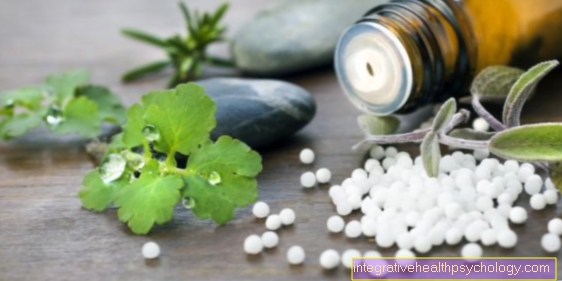


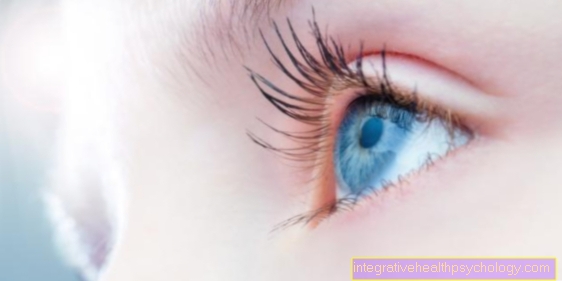

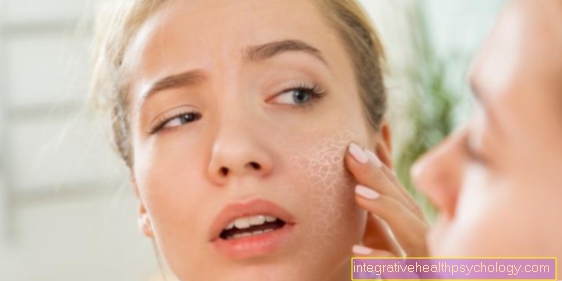

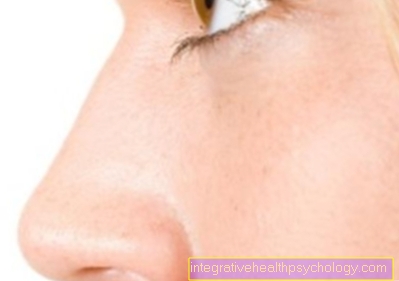





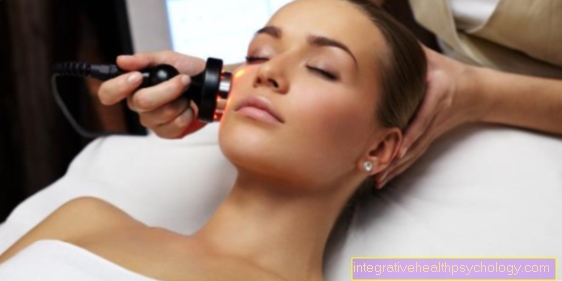








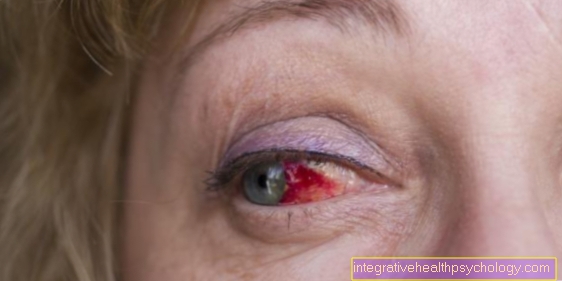
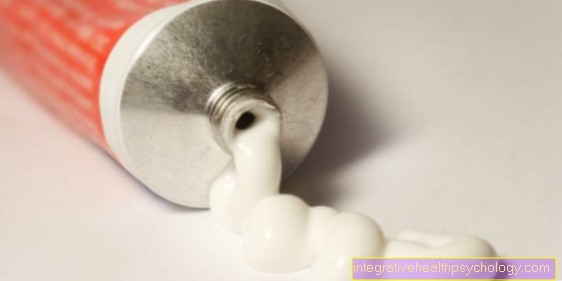
.jpg)
.jpg)